Book
ISBN: 9400714629 9786613453273 1283453274 9400714637 Year: 2012 Publisher: Dordrecht ; New York : Springer,
Abstract | Keywords | Export | Availability | Bookmark
 Loading...
Loading...Choose an application
- Reference Manager
- EndNote
- RefWorks (Direct export to RefWorks)
Language users access an array of information during the construction and interpretation of utterances, including grammatical rules and situational knowledge. The argument structure of verbs, which establishes the syntactic and semantic relationships between arguments, plays a key role in this process. This book reviews recent psycholinguistic and theoretical investigations into the interplay between structural syntactic relations and role semantics. It focuses on the interaction of case marking and word order with semantic prominence features, such as animacy, addressing the interaction of these different sorts of information from theoretical, time-insensitive and incremental perspectives or a combination thereof. Taking a broad cross-linguistic perspective, this book offers an interdisciplinary discussion of the interaction of case, word order and prominence with argument structure, and their effects on argument realization and interpretation in language.
Grammar, Comparative and general -- Case. --- Grammar, Comparative and general -- Word order. --- Languages & Literatures --- Philology & Linguistics --- Psycholinguistics. --- Language and languages. --- Foreign languages --- Languages --- Language, Psychology of --- Language and languages --- Psychology of language --- Speech --- Psychological aspects --- Psychology --- Linguistics. --- Linguistics, general. --- Theoretical Linguistics. --- Linguistics --- Thought and thinking --- Anthropology --- Communication --- Ethnology --- Information theory --- Meaning (Psychology) --- Philology --- Linguistic science --- Science of language
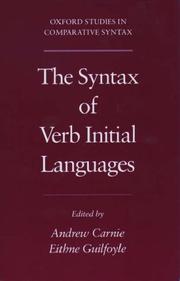
ISBN: 019513222X 0195132238 1280530677 0198030290 0195344014 1429403659 9780195132236 9780195132229 9781429403658 9780198030294 9786610530670 661053067X 0197722563 Year: 2000 Publisher: Oxford Oxford University Press
Abstract | Keywords | Export | Availability | Bookmark
 Loading...
Loading...Choose an application
- Reference Manager
- EndNote
- RefWorks (Direct export to RefWorks)
This volume contains 12 chapters on the derivation of and the correlates to verb initial word order. The studies cover such widely divergent languages as Irish, Welsh, Scots Gaelic, Old Irish, and Biblical Hebrew.
Grammar, Comparative and general --- Syntax --- Verb --- Word order --- Syntax. --- Verb. --- Word order. --- Comparative linguistics --- Grammar --- Language and languages --- Order (Grammar) --- Verb phrase --- Verbals --- Reflexives --- Linguistics --- Philology --- Grammar, Comparative and general - Syntax --- Grammar, Comparative and general - Verb --- Grammar, Comparative and general - Word order --- Grammar, Comparative and general Syntax
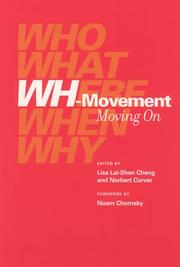
ISBN: 1282098411 9786612098413 026227017X 1429477245 9780262270175 0262033461 9780262033466 0262532794 9780262532792 9781429477246 9781282098411 6612098414 Year: 2006 Volume: 42 Publisher: Cambridge, Mass. MIT
Abstract | Keywords | Export | Availability | Bookmark
 Loading...
Loading...Choose an application
- Reference Manager
- EndNote
- RefWorks (Direct export to RefWorks)
Linguists reconsider issues raised in Chomsky's 1977 article "On Wh-movement" from the perspective of current Minimalist theory.
Grammar, Comparative and general --- Minimalist theory (Linguistics) --- Interrogative. --- Word order. --- Syntax. --- Language and languages --- Syntax --- Word order --- Interrogative (Grammar) --- Questions and answers (Linguistics) --- Generative grammar --- Order (Grammar) --- LINGUISTICS & LANGUAGE/General --- Grammar --- Extraction (Linguistics) --- Interrogative --- Linguistics --- Philology --- Grammar, Comparative and general - Interrogative. --- Grammar, Comparative and general - Syntax. --- Grammar, Comparative and general - Word order. --- Grammar, Comparative and general Syntax
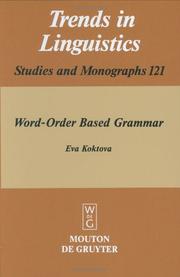
ISBN: 3110162520 3110803399 9783110162523 Year: 1999 Volume: 121 Publisher: Berlin De Gruyter
Abstract | Keywords | Export | Availability | Bookmark
 Loading...
Loading...Choose an application
- Reference Manager
- EndNote
- RefWorks (Direct export to RefWorks)
No detailed description available for "Word-Order Based Grammar".
Grammar, Comparative and general --- Word order. --- Syntax. --- Grammar --- Grammaire comparée --- Syntaxe --- Ordre des mots --- Language and languages --- Syntax --- Word order --- Order (Grammar) --- Linguistics --- Philology --- Grammar, Comparative and general Syntax --- Grammar, Comparative and general - Word order. --- Grammar, Comparative and general - Syntax.
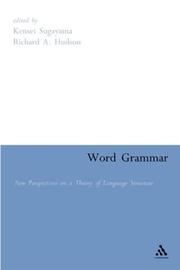
ISBN: 1441186522 1281294985 9786611294984 1847142737 9781847142733 9780826486455 0826486452 9781281294982 0826486452 1847140327 9781847140326 Year: 2006 Publisher: London New York Continuum
Abstract | Keywords | Export | Availability | Bookmark
 Loading...
Loading...Choose an application
- Reference Manager
- EndNote
- RefWorks (Direct export to RefWorks)
This book is an introduction to Word Grammar, a theory of language structure founded and developed by Dick Hudson. In this theory, language is a cognitive network - a network of concepts, words and meanings containing all the elements of a linguistic analysis. The theory of language is therefore embedded in a theory of knowledge, in which there are no boundaries between one form of knowledge and any other. The most controversial idea in Word Grammar syntax is that phrase structure is redundant, because all its work can be done by means of dependencies between individual words. Word-word depen
Dependency grammar. --- Generative grammar. --- Grammar, Comparative and general --- English language --- Valence (Linguistics) --- Mathematical linguistics --- Language and languages --- Word order --- Order (Grammar) --- Grammar, Generative --- Grammar, Transformational --- Grammar, Transformational generative --- Transformational generative grammar --- Transformational grammar --- Psycholinguistics --- Word order. --- Semantics. --- Semasiology --- Syntax --- Derivation --- Dependency grammar --- Generative grammar --- Semantics --- Linguistics --- Philology --- English language Semantics --- English language - Semantics --- Grammar, Comparative and general - Word order
Book
ISBN: 9783039117512 3039117513 Year: 2009 Volume: 87 Publisher: Bern Lang
Abstract | Keywords | Export | Availability | Bookmark
 Loading...
Loading...Choose an application
- Reference Manager
- EndNote
- RefWorks (Direct export to RefWorks)
Grammar --- Pragmatics --- Grammar, Comparative and general --- Linguistic change --- Discourse analysis --- Ordre des mots --- Changement linguistique --- Analyse du discours --- Word order --- Congresses. --- Congrès --- Focus (Linguistics) --- Prosodic analysis (Linguistics) --- Syntax --- Topic and comment --- Conferences - Meetings --- Congrès --- Comparative grammar --- Grammar, Philosophical --- Grammar, Universal --- Language and languages --- Philosophical grammar --- Linguistics --- Philology --- Grammar, Comparative --- Historical linguistics --- Grammar, Comparative and general - Word order - Congresses --- Grammar, Comparative and general - Syntax - Congresses --- Discourse analysis - Congresses --- Focus (Linguistics) - Congresses --- Grammar, Comparative and general - Topic and comment - Congresses --- Prosodic analysis (Linguistics) - Congresses
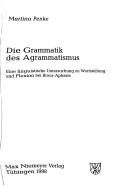
ISSN: 03446727 ISBN: 3484303786 9783484303782 3111848132 3110914689 Year: 1998 Volume: 378 Publisher: Tübingen : Max Niemeyer,
Abstract | Keywords | Export | Availability | Bookmark
 Loading...
Loading...Choose an application
- Reference Manager
- EndNote
- RefWorks (Direct export to RefWorks)
Im Agrammatismus, einer Sprachstörung infolge einer Hirnschädigung, sind Wortstellung und Flexion beeinträchtigt. Diese Monographie legt eine empirische Studie zum Agrammatismus im Deutschen vor, die auf Spontansprachdaten und experimentell erhobenen Daten von elf Agrammatikern basiert. Im Zentrum der Studie steht die Frage, welche Komponenten der grammatischen Kompetenz im Agrammatismus geschädigt sind. Die Studie zeigt, daß im Bereich der Wortstellung keine qualitativen Unterschiede zu normalsprachlichen grammatischen Repräsentationen vorliegen. Die Stellung des Verbs wird im Agrammatismus wie im normalsprachlichen System von der Finitheit des Verbs und dem Satztyp (Haupt-/Nebensatz) abhängig gemacht. Argumente konnten topikalisiert und mit Objektkasus markiert werden. Selektive Beeinträchtigungen kennzeichnen dagegen den Bereich der Flexion. Die wesentlichen Ergebnisse sind: 1) das Default-Pluralflexiv -s ist geschädigt, die irregulären Pluralflexive sind erhalten; 2) die reguläre Partizipflexion ist erhalten, die irreguläre geringfügig beeinträchtigt; 3) die reguläre Kongruenzflexion ist beeinträchtigt, die irregulären Suppletivformen sind es jedoch nicht. Daß reguläre und irreguläre Flexionsformen vom Agrammatismus unterschiedlich betroffen werden, spricht dafür, daß sie auf verschiedenen kognitiven Prozessen basieren: Während reguläre Formen durch Affigierung gebildet werden, sind irreguläre Formen als Vollformen gespeichert. Die Relevanz dieser selektiven Defizite für die linguistische Theoriebildung wird diskutiert.
Afasie --- Afasie [Broca-] --- Agrammatism --- Agrammatisme --- Agrammatologia --- Aphasia --- Aphasia [Broca ] --- Aphasie --- Aphasie de Broca --- Grammatical speech disorders --- Speech disorders [Grammatical ] --- Grammar, Comparative and general --- Word order --- 803.0:801.5 --- Duits. Duitse taalkunde-:-Grammatica --- 803.0:801.5 Duits. Duitse taalkunde-:-Grammatica --- Agrammatism. --- Word order. --- Agrammatic aphasia --- Speech disorders, Grammatical --- Grammaticality (Linguistics) --- Language and languages --- Order (Grammar) --- Linguistics --- Philology --- Grammar, Comparative and general - Word order --- PSYCHOLINGUISTIK --- DEUTSCHE SPRACHE --- LANGAGE, TROUBLES DU --- SPRACHSTÖRUNGEN --- APHASIE
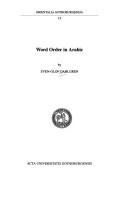
ISBN: 9173463280 9789173463287 Year: 1998 Volume: 12 Publisher: Göteborg, Sweden : Acta Universitatis Gothoburgensis,
Abstract | Keywords | Export | Availability | Bookmark
 Loading...
Loading...Choose an application
- Reference Manager
- EndNote
- RefWorks (Direct export to RefWorks)
Arabic language --- Grammar, Comparative and general --- Discourse analysis, Narrative --- Dialects --- Syntax --- Word order --- -Arabic language --- -Discourse analysis, Narrative --- -Comparative grammar --- Grammar --- Grammar, Philosophical --- Grammar, Universal --- Language and languages --- Philosophical grammar --- Linguistics --- Philology --- Narrative discourse analysis --- Narration (Rhetoric) --- Semitic languages --- -Syntax --- Grammar, Comparative --- Discourse analysis, Narrative. --- Syntax. --- Word order. --- -Dialects --- Order (Grammar) --- Dialects&delete& --- Arabic language - Dialects - Syntax --- Arabic language - Word order --- Grammar, Comparative and general - Word order
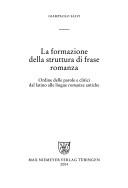
ISBN: 3484523239 3110945509 9783484523234 Year: 2004 Volume: 323 Publisher: Tübingen Niemeyer
Abstract | Keywords | Export | Availability | Bookmark
 Loading...
Loading...Choose an application
- Reference Manager
- EndNote
- RefWorks (Direct export to RefWorks)
Il volume studia i meccanismi del cambiamento diacronico della struttura di frase fra latino classico e lingue romanze antiche utilizzando il quadro teorico della Grammatica Generativa. Dopo una descrizione dettagliata dei fenomeni dell'ordine delle parole in latino, viene formulata un'ipotesi sulla struttura di frase di questa lingua. Per le lingue romanze antiche vengono individuate due grammatiche in concorrenza, una innovativa a Verbo Secondo e una con caratteristiche più simili a quelle del latino, e viene formulata un'ipotesi sul meccanismo diacronico che ha portato dalla struttura di frase latina a quella innovativa romanza, ipotesi che vede nelle strutture latine a verbo iniziale il punto di partenza dell'evoluzione. Vengono poi ricostruiti i cambiamenti intervenuti nel sistema di collocazione delle forme deboli dei pronomi nel passaggio dal sistema latino al sistema romanzo arcaico. Infine si affronta il problema del cambiamento di categoria delle forme pronominali deboli del latino che diventano i clitici delle lingue romanze antiche, cambiamento scatenato dalla progressiva perdita del sistema morfologico dei casi e favorito dalla contiguità fra posizione delle forme deboli e posizione del verbo nel latino tardo; la successiva evoluzione dei clitici romanzi permette di operare distinzioni più sottili relativamente alle varie tappe del processo di grammaticalizzazione che porta dalle parole deboli del latino agli affissi che troviamo in alcune lingue romanze.
Romance languages --- Historical linguistics --- Classical Latin language --- Latin language --- Grammar, Comparative and general --- Latin (Langue) --- Langues romanes --- Pronom --- Clitiques --- Grammaire comparée --- Grammar, Comparative --- Romance. --- Latin. --- Pronoun. --- Clitics. --- Word order. --- Romane --- Latin --- Ordre des mots --- Romance --- Pronoun --- Clitics --- Word order --- Grammaire comparée --- Clitics (Grammar) --- Accents and accentuation --- Tagmemics --- Pronouns --- Language and languages --- Order (Grammar) --- Neo-Latin languages --- Italic languages and dialects --- Classical languages --- Classical philology --- Latin philology --- Grammar, Comparative&delete& --- Function words --- Nominals --- Reflexives --- Linguistics --- Philology --- Latin language - Grammar, Comparative - Romance --- Romance languages - Grammar, Comparative - Latin --- Grammar, Comparative and general - Pronoun --- Grammar, Comparative and general - Clitics --- Grammar, Comparative and general - Word order --- Romance languages - Pronoun --- Romance languages - Clitics --- Romance languages - Word order
Book
ISBN: 9048192064 9786613003119 9048192072 1283003112 Year: 2010 Publisher: Dordrecht : Springer,
Abstract | Keywords | Export | Availability | Bookmark
 Loading...
Loading...Choose an application
- Reference Manager
- EndNote
- RefWorks (Direct export to RefWorks)
The topic of variation in language has received considerable attention in the field of general linguistics in recent years. This includes research on linguistic micro-variation that is dependent on fine distinctions in syntax and information structure. However, relatively little work has been done on how this variation is acquired. This book focuses on how different types of variation are expressed in the input and how this is acquired by young children. The collection of papers includes studies of the acquisition of variation in a number of different languages, including English, German, Greek, Italian, Korean, Norwegian, Swiss German, Ukrainian, and American Sign Language. Different kinds of linguistic variation are considered, ranging from pure word order variation to optionally doubly filled COMPs and the resolution of scopal ambiguities. In addition, papers in the volume deal with the extreme case of variation found in bilingual acquisition.
Discourse analysis. --- Grammar, Comparative and general -- Word order. --- Typology (Linguistics). --- Languages & Literatures --- Philology & Linguistics --- Psycholinguistics. --- Language acquisition. --- Linguistics. --- Grammar, Comparative and general --- Word order. --- Applied linguistics. --- Syntax. --- Linguistics, general. --- Applied Linguistics. --- Linguistic science --- Science of language --- Language and languages --- Language, Psychology of --- Psychology of language --- Speech --- Linguistics --- Psychology --- Thought and thinking --- Psychological aspects --- Word order --- Order (Grammar) --- Acquisition of language --- Developmental linguistics --- Developmental psycholinguistics --- Language development in children --- Psycholinguistics, Developmental --- Interpersonal communication in children --- Psycholinguistics --- Acquisition --- Grammar, Comparative and general. --- Comparative grammar --- Grammar --- Grammar, Philosophical --- Grammar, Universal --- Philosophical grammar --- Philology --- Grammar, Comparative --- Grammar, Comparative and general Syntax --- Syntax

 Search
Search Feedback
Feedback About UniCat
About UniCat  Help
Help News
News